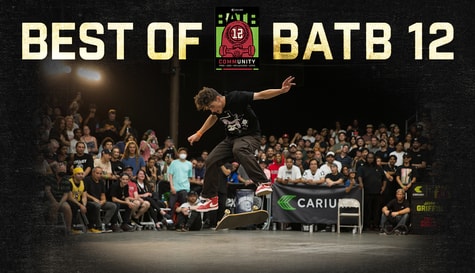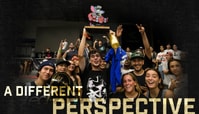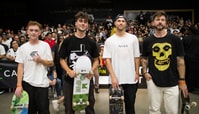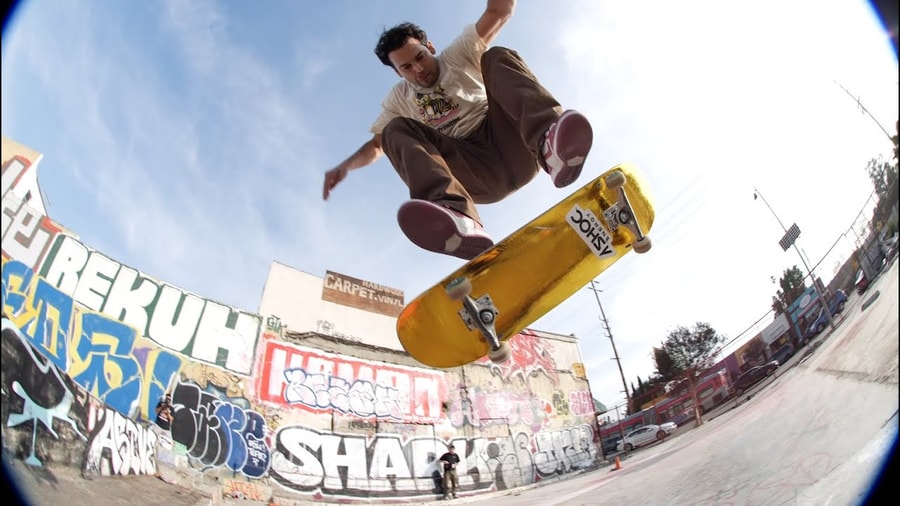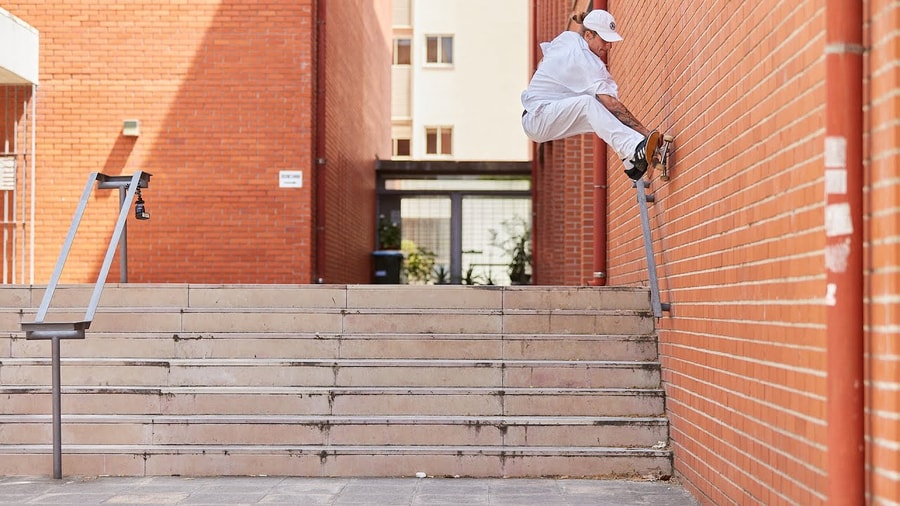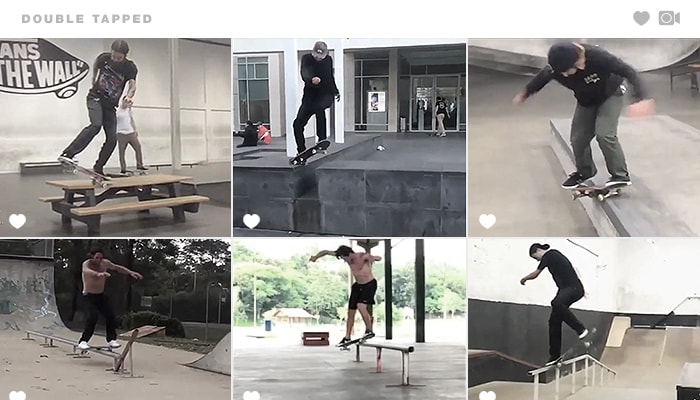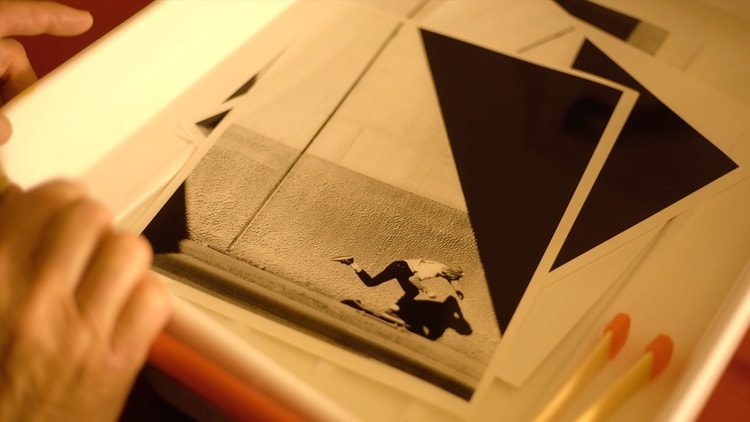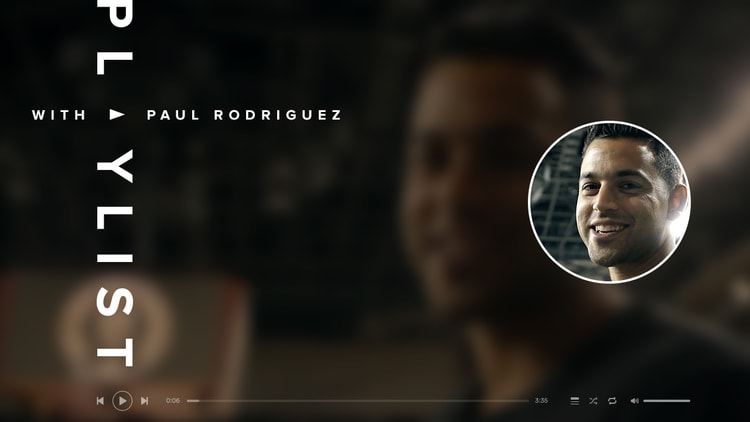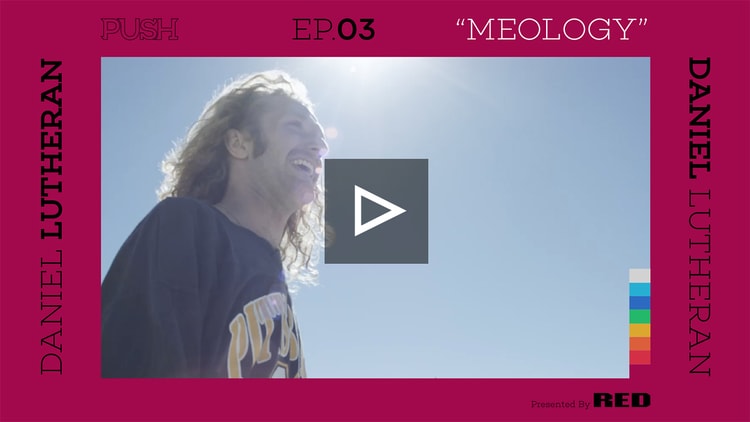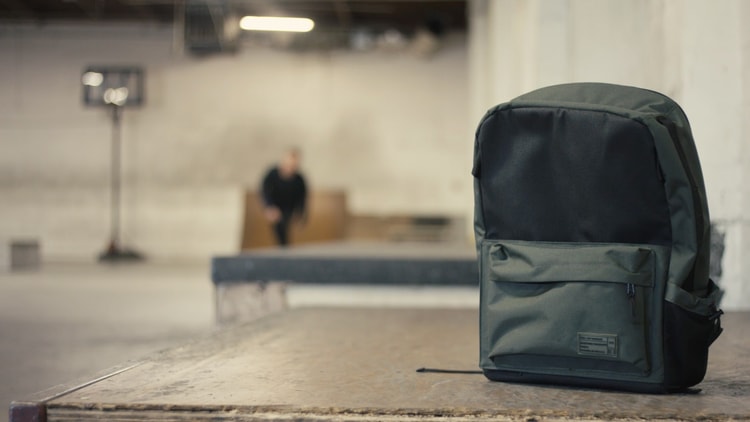PAUL RODRIGUEZ: MILESTONE — From The Skateboard Mag Issue 06

PAUL RODRIGUEZ: Milestone
words paul zitzer° photography atiba°
Who do you think you are?
It’s a question people often raise in an effort to put someone in their place, but it’s also one worth thinking about. Who do you think you are? While it’s certainly easy enough to ask, it’s probably impossible to effectively answer. That doesn’t mean people through the ages haven’t given it their best shot. A few notable attempts come to mind, like John Lennon and the Beatles for example, who sang, “I am the Walrus.” Although it’s difficult to determine what exactly he meant, as long as it made sense to John, that’s what really matters—goo goo g’joob.
A lot of health nuts come at it from a different angle, claiming that you are what you eat, but that seems to limit our potential a bit, doesn’t it? Being a sandwich wouldn’t really cut it. Maybe Popeye had the smartest approach by keeping his answer simple and open for interpretation when he said, “I yam what I yam.” It’s hard to argue with that one.
Regardless of who we think we are, the only way to even come close to figuring it out is to experience what life has to offer, and see what we end up with. While most of us have to do that the hard way by learning from our mistakes, one individual comes to mind who’s had to glean his lessons from his virtually unfettered success; welcome to the world of Paul Rodriguez.

Although each and every one of us would probably love the opportunity to do the same, after listening to his story, you’ll realize that it’s not as fun and easy as you might have thought. While we’re still trying to figure out just who we are, Paul, or P Rod, or Baby Sparkles, or whatever you choose to call him, is way ahead of us. He already knows who he is and he’s ready to tell us about it. But while Paul is filling us in on what his success has made of him, we should remember to ask ourselves, “What have our failures made of us?”
Although Paul is only nineteen, he’s already accomplished more than a lot of us aspire to in a lifetime. First, he’s developed what many say are Koston-esque skills on a skateboard. Second, he’s achieved a tremendous helping of popularity. And third, in doing the first two, he’s acquired a mile-high pile of cash to seal the deal. All of these may look like positives on the surface, but they’ve come with their share of problems. Jealousy, resentment, and misunderstanding have plagued his short career. Well, maybe plagued is too strong a word, but outsider speculation has done enough to get him pretty worked up. As you’ll soon see for yourself, Paul’s success has made him somewhat of a lightning rod, but he’s doing his best not to let it get to him, fighting back with his side of the story, which is a good one. And while you might disagree with one or two of his opinions, it’s these differences that make our world go ’round, or at least make the rotation interesting.

*You’d think the same shoe company that sponsors Michael Jordan would put a little bit more effort into hooking up Paul’s TF. Switch backside heelflip at the not-quite-state-of-the-art Nike skate gym. *
Paul grew up in Los Angeles with his mom and older sister. In case you didn’t already know, he shares the same name as an internationally know comedian and actor, who is currently starring in a new movie called Baadasssss. And while it sounds like one big terrible coincidence, or at the very least a potential lawsuit over who has the rights to the Paul Rodriguez name, it’s not like that, because THAT Paul Rodriguez, the really famous one, is the father of THIS Paul Rodriguez. So it’s fair to assume that Paul grew up in the Hollywood hills, hobnobbing at glitzy parties with fellow celebrity sons and daughters. You probably wouldn’t even be surprised if you found out that he was dating Mary Kate and Ashley. Well, Paul would be disappointed with you for believing the hype. “You guys have got the harshest picture. I didn’t grow up in no mansion or nothing. I wasn’t poor. I mean, I’m basically middle class. I live in a house, I grew up with my mom, went to a public school just like every other kid. I didn’t have all kinds of fancy shit, you know?” Well, we know NOW.
So what’s it like to have a famous comedian hanging around the house? “It’s just like how skaters are, you know?” Paul says. “When I’m not skating we’re talking about skating, watching videos, looking at magazines. It’s the same thing with my dad when he’s not onstage cracking a joke. He was the class clown when he was a kid. It’s cool. When there’s an opportunity for a joke he sees it, he seizes the moment.” They say the apple doesn’t fall far from the tree, and if they’re right, Paul would be the same way, always cracking jokes, but ‘they’ don’t always know what they’re talking about. “I probably have a bad sense of humor compared to him,” Paul says. “That gene didn’t carry over.”

Who needs jokes when you can ride a skateboard like Paul? It’s obvious he’s a prodigy, a golden child, one of those rare few for whom it can be said was born to skate. And it’s not because he’s been riding since he could walk or anything like that. As a matter of fact, he didn’t get his first board until a week before he turned twelve—a little over seven years ago. He was shop sponsored a year or so after that. When he was fifteen he got hooked up by DNA and two years later turned pro for City Stars. As the timeline very clearly shows, he’s a quick study. And of course we all know that he rides for Girl now, thanks to his unbelievable skill, which caught the eye of one of skateboarding’s biggest names. “I had just left City Stars, and I was a free agent for a while—just roaming without a sponsor” he says. “I was skating with Eric [Koston] a bunch, and Eric just told me, “The offer is there if you‘d like it.” So I was just like, “Shit, it’s Girl, so yeah!” More like, Yeah Right! No sponsor me tape, no uncomfortable phone calls to team managers, just solid skating and a good attitude. We should all be able to learn something from that.
He’s obviously hyped to have great sponsors—Nike, Girl, and Fourstar among them—but he’s had to make some tough decisions to get there. “The hardest part is when you gotta quit sponsors,” he says. “Because everyone takes it personally.” There are a lot of pros out there who would love to have that problem instead of admitting that getting kicked off sponsors is the hardest part. Paul is probably happy not to be in that boat, but it doesn’t make his situation any easier. “At the same time, [the companies] gotta realize that this is a business,” he continues. “So, basically, it’s trying to keep relationships with people and not trying to burn too many bridges.”
In an effort to make his skating career more lucrative, without burning any more bridges than necessary, Paul hired an agent to help him work out deals. But while many skaters will give a big thumbs up to the idea of letting an agent deal with companies like Burger King or Coca-Cola, when a skater sends his agent to talk to his skate sponsors, people get a little sensitive. Often times skateboard companies are inclined to keep their riders in the dark about how much they’re worth, and agents have a knack of showing them the light. Paul admits that without an agent, he “would have accepted anything that came to the table. And now that (my agent) came, she’s like, ‘Look, I can get you the best that you deserve.’ And I’m like, ‘Hey, that works for me.’” So she deals with his mainstream sponsors *and *his skate sponsors. Because of this, Paul has felt the wrath of other peoples’ viewpoints, but he’s not backing down for the sake of winning friends. “Everyone’s got their opinion, you know?” He says. “But so what? I don’t care; have your opinion. At the end of the day, I gotta do what’s right for me and my people, so whatever.” And while it seems like maybe he really does care, he just isn’t going to let it affect what he’s doing.

While the average Joe would be psyched to eek out a sketchy make on this backside nollie flip, Paul did it a bunch of times before finally nailing the land to switch-carve-out-the-gate.
Perhaps the most controversial of all of Paul’s business moves was his decision to ride for Nike. And although he makes it perfectly clear that it wasn’t an easy thing for him to do, he also makes it clear that it was the right thing to do. “[Quitting éS] was rough, because, dude, I love éS. I was down for éS; éS is tight, but when you’ve got the opportunity of a lifetime and you don’t take it, that means you’re a damn fool. Five or ten years from now, I don’t want to be like, ‘Damn, man! What if I would have rode for Nike? What if?’ You gotta take risks if you want to get ahead in this life.” That’s smart thinking for a person of any age, but remember that although Paul is still young, he’s a quick learner. And with the experience his dad has dealing with success and fame, Paul Sr. has provided solid advice to help Paul Jr. to do the best thing for his present and future.
Not only did Paul get grief for bailing out on his friends over at Sole Tech, but his name started to be linked with perhaps the most frowned upon word in skateboarding: SELLOUT. Especially after he was quoted in a* Skateboarder Magazine* interview saying that he only rode for Nike because of the money. During the interview for this Milestone, when the topic came up, Paul didn’t even wait to hear the question, he knew it was coming, and he couldn’t wait to let us know what’s what. “Everybody is crazy right now,” he said. “That’s what everyone wants to think. Okay, obviously we all know the money is good, that’s not a secret. But regardless, I’ve been wearing Nikes since I was born … Nikes were my first pair of shoes. Air Jordans. I’ve been rocking Nikes my whole life, and all of a sudden I get a deal from Nike and I’m a sellout? In that interview, I didn’t strictly say, ‘I ride for Nike for the money,’ but apparently that’s all they put. But some people, that’s all they want to hear. They don’t step back for a second and realize this came from another person’s perspective, you know?”

*Just a few years ago, switch backside tailslides on handrails were more than most people could comprehend. Paul proves that while some things change, many more stay the same. Incomprehensible ssbsts. *
At this point in the discussion, he’s getting fired up, he’s out of breath, his mouth barely keeping up with his mind. He’s not happy about what’s been said, and he’s not letting it slide. “I’m glad to be doing an interview, I’ll answer all those questions,” he continues. “Do you not go to school and go to college to be successful? Is it my fault I’ve been skating hard and working hard? When the opportunity for success comes, should I be like, ‘No?’ When did that become a bad thing?” He makes a good point, and it raises the question; is the only real skateboarder one that never becomes too successful? In skateboarding, skateboarders want their peers to succeed in certain ways, while maintaining the belief that other ways are bad, namely “mainstream” ways. But those beliefs are arbitrary, subjective views, and if you let them run your life, prepare yourself for an eternal couch tour. Paul knows this, and he lets this knowledge drive his decision making—much more so than a need to fit in with the crowd. “That’s not what I’m all about,” he says. “I’m not all about greed. What they don’t know is that I take care of my mother; what they don’t know is that I’ve got bills. I’m not a fuckin’ little greedy kid, you know?”
It’s surprising to hear a pro skater saying the things that Paul says. Not because he shouldn’t be saying them, but rather because you just don’t hear a lot of skaters man up. They don’t want to look like they’re too eager to secure their futures, or appear too “professional.”
With his tirade winding down, Paul says, “People, they get jealous because, hey, some people are out there working trying to get where they want to be instead of just sitting there complaining and dreaming. Some people are dreamers, and some people are doers, you know? At the same time, I will be thirty and forty years old one day. At that point do you think I’m going to be like, ‘Hey, you know what, I’m broke as a joke, but as long as I kept it real, right?’ No, that’s not going to fly when I’m telling my kids I can’t buy them fucking food.”
And after all of that, if you still want to call Paul a sellout, that’s your business. “I’m not going to sit here and be like, ‘Oh, everyone thinks I’m a sellout, they don’t like me,’” he says. “I don’t care. If you don’t like me, you don’t like me. If you like me, thank you.”

This trick would be called a big spin boardslide even if Paul was doing it on a two-inch flatbar. Taking into account the fact that he’s doing it down a nine-stair, it should be called something along the lines of a gargantuan spin boardslide, or maybe even a 64-ounce super big spin boardslide deluxe. Either way, the boardslide is still just a boardslide.
With the big money and the big sponsors come big expectations, and sometimes it all comes down to the pressure. With the wrong attitude or an inability to deal with it, pressure—imposed by others or self-inflicted—has lead to the downfall of more than a few good skaters. Paul tries to keep things in perspective, and not let the negatives get to him. “I try not to feel pressure because, bottom line, I didn’t start skating to please everybody else,” he says. “I started skating because I love to skate, just like every other skater. You gotta watch out because there will come a point where you’ll forget that.” Once again, it all comes back to what he’s learned and he wasn’t born with the ability to shrug it off, he grew into it. “As I’m getting slightly older, I’m starting to learn that you can’t worry about everybody else. Everybody has their own problems and things they gotta deal with, so I just block that out. I stay away from the whole scene; I stay away from all the hype. I skate with my friends and just try to keep it as normal as it used to be.” His friends will just have to get used to the idea that their fellow skate rat has a signature shoe on Nike, and the checks to match. The shoe is slated to debut in September.
The day this interview took place, Paul was in the middle of packing boxes, preparing to move into the brand new house he just bought in Chatsworth. You could say that he’s moving on up. “The house I’m staying in now is falling apart … skate rat house, dirty,” he says. “I’m over that, I’ve got my place, I’ve got one roommate, and it’s going to be mellow.” Not only does he have his own home, but he also has a Mercedes G-Wagon, and a CLK. Not too shabby. But don’t expect a riches-to-rags story from Paul any time soon, because while he may indeed be spending money, he’s definitely not blowing it. “I’m no idiot. I’ve got plans, I’ve got all kinds of … what do they call them? Trust funds, bonds, whatever. I got all that shit. I’m definitely smart with my cash,” he says.
If you ever watch television, you are probably aware that one of America’s favorite pastimes is cheering at the downfall of its celebrities, and skaters are no different when it comes to targeting the superstars. Paul feels it more and more, but true to form, he has an interesting take on that, too. “When you start getting more successful, people start looking at you from a different perspective,” he says. “And it’s not that you don’t change when you become successful, but at the same time, [others] don’t look at it like, “Maybe my perception has changed.”
Like he said, maybe he has changed as he’s become successful, but we all change, even if we become complete failures. Life does it to us, and that isn’t necessarily a bad thing. But a lot of people don’t want to give Paul that freedom. Look at his religious views for example; he has always been an outspoken Christian, going to church on Sunday, thanking God for his blessings, and as he’s gotten older, he’s the first to admit, “Lately I haven’t been as good as I should have been.” Of course, people can’t wait to give him a hard time for it, but he’s not having it. “I never said I was perfect, man. I believe in God and I try my best, but at the same time, I’m going to fuck up just like everyone else. Everyone is always like, ‘You’re supposed to be Christian; you can’t do that. You gotta be perfect!’ But I’m over that. You’ll see me mess up, everyone is going to mess up, and the bottom line is, God’s not waiting for me to be perfect. As long as I keep my heart to God, stay true, then whatever.”
When all is said and done, Paul’s career still comes down to great skateboarding, and he doesn’t let himself get a false sense of security about anything. In other words, he still skates a lot. “I skate everyday, at least a couple of hours,” he says. “It’s been hard lately because I live in The Valley, and it gets like a hundred and something degrees, especially in the summer. So usually I end up going to the skatepark at night. Then on the weekends I’ll go out and skate all day, you know, go to all the spots and everything.” While a lot of older pros spend the week recovering from their weekend filming missions, Paul’s still young enough to recover by Monday morning, and then skate all week.

While he has no intention of letting his skating slow down, Paul does have his sights set on other areas, namely acting. Of course, he’s had to defend himself against those who claim he’ll give up skating for it. But rest assured, skating is his first love, and he’s sticking to it. What’s funny is that his dad could have hooked him up with acting jobs from the beginning, but Paul wasn’t interested. He has too much pride. “I didn’t want to grow up my whole life like, not having worked for it, because my dad could get my foot in the door at any moment,” he says. “That’s why with skateboarding I’m so happy I came up on my own. I did it to show my dad, like, “Look, I appreciate you offering me opportunities to start acting and all that, but I don’t want to be thirty, forty years old and be like, shit, I didn’t even create this for myself. I was just handed this.” I’m happy knowing that I don’t ask my dad for a dollar, ever, never. He don’t pay me nothing, don’t give me nothing.” That’s an interesting take on things, because while many people are motivated to work hard by a fear of being a failure, Paul found motivation from not wanting to succeed the easy way. It’s good example of how he has learned life’s lessons differently than the rest of us. At this point, having become what he calls a “self-made man,” he’s a little more open to using his dad’s connections, but only because he knows he can do it without him.
But before we see Paul starring in any big time Hollywood movies, we’re sure to see a lot more of him in skate magazines and videos. We could have him around for ten more years, at least. He looks to people who have been in the game the longest for inspiration to keep it up—Tony Hawk and Koston, for example. He figures if they can do it, he can too. “I’ve stayed motivated this long, why should it change?” He asks. “God willing, my love of skateboarding will always be there. God willing, my body will stay here to keep me going.”

This is Paul’s impression of what a switch kickflip would look like without using his toes. Switch heelflip.
In the end, no matter how big he’s become, or how quickly it’s all happened, Paul’s doing his best to keep it in perspective, and not let any of it affect him too much. “Once you think you’re fucking big, hot shit, then it’s not fun anymore,” he explains. “I like to get psyched when I go skate with Koston you know? I don’t see myself like that. I’m still in the mentality of a little kid skater, you know?”
Whether he can continue to feel that way has yet to be seen, but for the time being he’s loving every minute of it, and not taking anything for granted. “My goal, my dream has already come true. Every kid’s dream is to become a pro skater, you know? Not only have I become a pro skater, but to me personally, I ride for the best sponsors there are, you know? That’s even more than I ever expected. I thank God every day for that.”

It’s impossible to say whether this photograph better represents a beautifully executed example of a P Rod backside Smith, or a tragic glimpse of 21st century man’s struggle to escape the confines of an environment dictated by the whims of abstract art.
_Subscribe to The Skateboard Mag_ today and get 12 issues delivered to you for only $19.95. Issue #155 is out now, and includes a feature on the upcoming “In Transition,” Santa Cruz’s “Right To Exist,” The Education of Simon Bannerot, Ben Raybourn’s “Ravebourn,” and much more!


